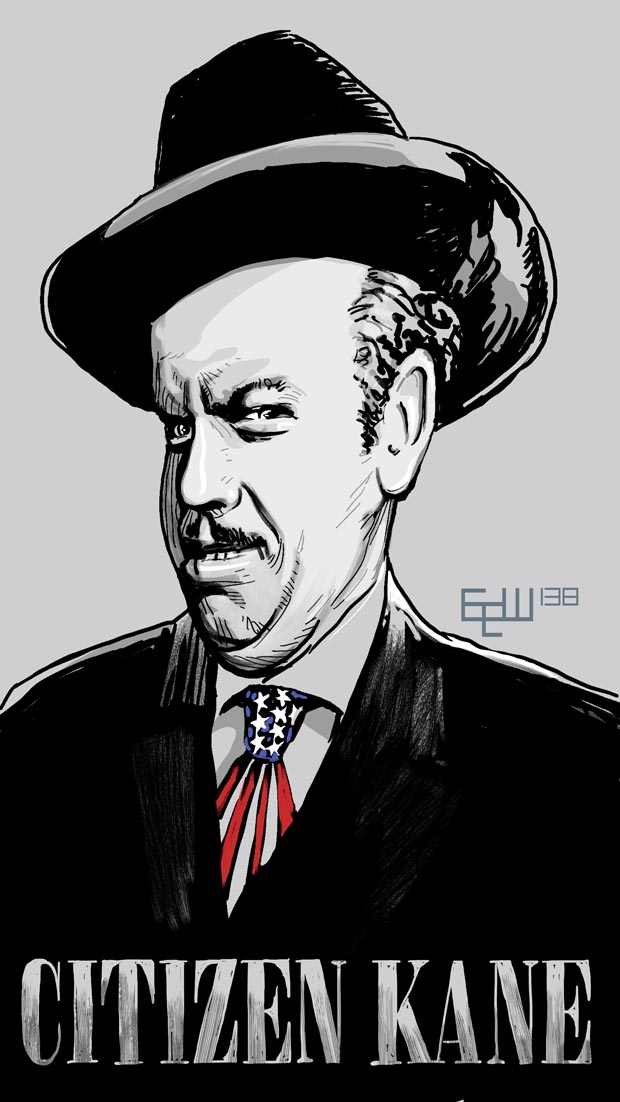Citizen Kane - 1941
The Greatest Film Ever Made?
They say it's Number One

Citizen Kane is usually at the top of "Greatest Movie" lists all around the world. (Though, lately Hitchcock's Vertigo has pushed Orson Welles' Magnum Opus down to the number two slot on a few of those lists. More about that below.)
What can be said about Citizen Kane that hasn't already been voiced? It's been heavily critiqued and examined for all of the usual references toward American identity, national insecurity, a celebration (or debunking) of the classic rags-to-riches story. And what is "Rosebud," (really) anyway?
Gothic
Visually told in the style of a gothic horror movie, but with a script that's of the sharp-elbowed newspaper reporter genre that Hollywood once produced so frequently, Citizen Kane gets sunk into a Shakespearean funk midway through with a long (but ultimately vague) view at what's really going on in the heart and head of the titular character - - does he just want the love that he was denied when his mother sent him off to be raised as an (unexpectedly) wealthy member of America's elite? Is he demanding everyone love him as a Luciferic subsitute for Mom (as Joseph Cotten's character – sort've – declares)?
Money Trouble
We might say that by the end we simply see a controlling egocentric who exposes himself as a grumpy old man with a penchant for a younger woman he can't understand. And on top of that is the lesson that all the money in the world cannot solve such a problem, which isn't exactly a new idea coming from a film coming out right at the end of the American Great Depression when what money can and can't do was an explored topic in films from the serious to the screwballs throughout the preceeding years of the crashed American (and world) economy..
Kane moves about his imitation castle like an aged, gigantic toddler, an environment meant to boast to all of his power but is instead become a vault of priceless objects, none of which make any sense in view of his dilemma of acute loneliness (among other things).
It's a visual that's a hundred times larger than the one we see in Tennessee Williams' Cat on a Hot Tin Roof in which 'Big Daddy' sits in his basement also claustrophobically packed with a lifelong buying spree of expensive nick-knacks. But Big Daddy escapes to settle matters with his family, but in Citizen Kane, the hero has nothing of the sort available, just maids, butlers, and nurses (who ironically could not have heard him mumble the famous phrase that marks the mystery of the movie!)
Remember, the screenwriters named him Kane for a reason (and not William Randolph Hearst for many more reasons).
Ambiguity
There's enough ambiguity in Citizen Kane to leave room for the movie reviewer (or analyst) to travel in whatever direction they might want in dissecting Mr. Kane. And maybe that's what ultimately helps it rank in at the #1 slot (or #2, and note that Hitchcock's Vertigo is soaked in ambiguity, too) in all those Greatest Films Ever Made lists.
Technically the movie can't be faulted, and the story is expertly told and written, and for Orson Welles to walk in and make this his first effort at feature film directing is amazing.
But if we can't stake out why exactly Citizen Kane is number one with so many movie reviewer pros, maybe it shows what is fundamentally wrong with 'greatest' lists, a catchall for group consensus and a place where tradition (afterall the movie pro is forever looking at the past) holds real weight.
Vertigo vs Citizen Kane
Both movies are about men who shape "reality" to suit their needs. In Vertigo, retired police Detective Scotty (Jimmy Stewart) whether he knows it or not, continues trying to solve the the matter of the death of a woman he loved. Hitchcock said the film is essentially about necrophilia, but an easier reach would be to simply say Detective Scotty is better at the task of solving murders on a subconscious level.
In both films, the protagonist will not acknowledge the limits of their humanness, and it destroys their worlds.
Citizen Kane, 1941
Directed by Orson Welles
Written by Herman J. Mankiewicz and Orson Welles
Starring Orson Welles, Joseph Cotten, Dorothy Comingor
Related: Citizen Kane and Citizen Kane turns 70
What's Recent
- Island of Desire - 1951
- Road to Morocco
- The Devil and Miss Jones - 1941
- Sinners - 2025
- Something for the Boys - 1944
- The Mark of Zorro - 1940
- The Woman They Almost Lynched - 1953
- The Cat Girl - 1957
- El Vampiro - 1957
- Adventures of Hajji Baba – 1954
- Shanghai Express 1932
- Pandora's Box – 1929
- Diary of A Chambermaid - 1946
- The City Without Jews - 1924
- The Long Haul
- Midnight, 1939
- Hercules Against the Moon Men, 1964
- Send Me No Flowers - 1964
- Raymie - 1964.
- The Hangman 1959
- Kiss Me, Deadly - 1955
- Dracula's Daughter - 1936
- Crossing Delancey - 1988
- The Scavengers – 1959
- Mr. Hobbs Takes A Vacation - 1962
- Jackpot – 2024
- Surf Party - 1964
- Cyclotrode X – 1966
Original page March 2014 | Updated June 20, 2023